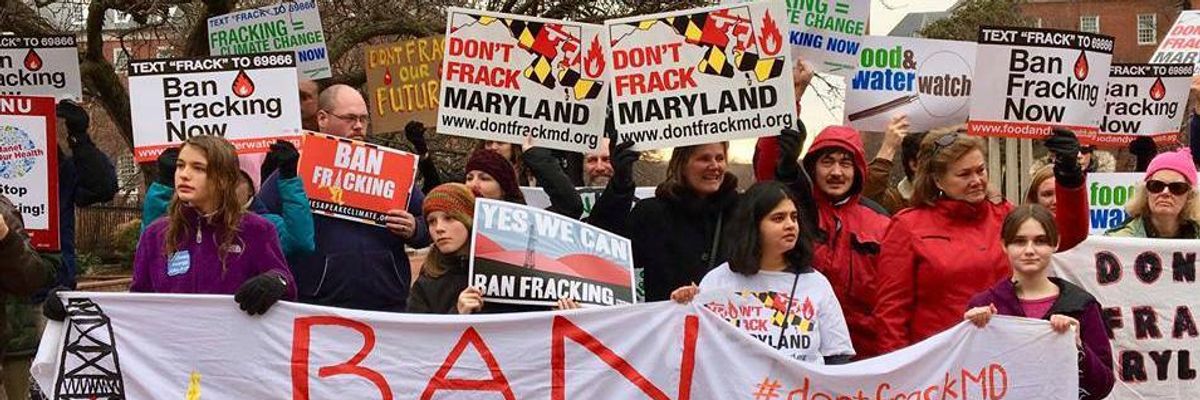On the eve of a global climate strike and just days before a major United Nations climate summit, more than 450 environmental activists and organizations sent an open letter Thursday to U.N. Secretary-General Antonio Guterres urging him to support a global ban on fracking for fossil fuels, highlighting growing concerns about public health and the climate emergency.
"As you are aware, manmade climate change is the biggest and most comprehensive existential threat humanity has ever faced--apart from a nuclear war," the letter reads. "However, at a time when global forces must be combined to combat the foreseeable and enfolding mass extinction of our planet, the oil and gas industry--backed by many irresponsible governments--bets on a fossil fuels extraction technique that will destroy the joint forces of humanity: hydraulic fracturing, better known as fracking."
Organized by the U.S. advocacy group Food & Water Action, its European arm Food & Water Europe, and Pennsylvania-based air quality group the Breathe Project, the letter lays out the oil and gas industry's contributions to methane emissions, how hydraulic fracturing supports the plastics industry, and the environmental, health, and human rights implications of fracking.
Letter signatory Robert Howarth, a Cornell University professor of ecology and environmental biology whose research on methane leaks has exposed climate impacts of fracking, explained Thursday that "over the past decade, methane levels have been rising rapidly in the atmosphere, contributing significantly to the unprecedented global climate disruption seen in recent years."
"Over 60 percent of the increased global methane emissions are from the oil and gas industry, and shale gas development in North America is responsible for one-third of the increased emissions from all sources," Howarth said in a statement. "Fracking for shale gas is a climate disaster."
As actress and U.N. Human Rights Champion Amber Heard put it: "Every well and every pipeline adds more methane and carbon dioxide to the atmosphere and pushes us closer to the edge of the climate cliff. The science demands, and our children demand, a global ban on fracking."
Biologist Sandra Steingraber, a longtime critic of fracking, pointed out that "a decade ago, when there were only nine scientific studies on the impacts of fracking, some political leaders suggested that fracking might serve as a bridge to a stable climate. Now there are 1,800 studies, and the science is clear."
"Fracking is making the climate crisis worse," said Steingraber. "Fracking is destroying drinking water and undermining human rights around the world. Fracking is harming health through toxic air pollution and supporting a polluting plastics industry that is killing our oceans. Our planet is on fire, but fracking is not an evacuation bridge nor a fire extinguisher. Fracking is an arsonist that needs to be stopped everywhere and right now."
Concerned Health Professionals of New York--which Steingraber co-founded--and Physicians for Social Responsibility in June published a comprehensive analysis of nearly 1,500 scientific, government, and media reports detailing the various health and climate consequences of fracking. The analysis noted with alarm that U.S. oil and gas production, backed by President Donald Trump's administration, "has spurred a massive build-out of fracking infrastructure."
Without increased public opposition and government regulation, that build-out is only expected to continue throughout the United States. A first-of-its-kind report released in June by Food & Water Watch showcased more than 700 recently built or proposed facilities across three industries that benefit from and help fuel the U.S. fracking boom: the petrochemical and plastics industries, gas exporters building liquefied natural gas (LNG) terminals, and natural gas-fired power plants.
Wenonah Hauter--founder and executive director of Food & Water Watch, Food & Water Action, and Food & Water Europe--noted in a statement Thursday that U.S. opponents of fracking have had some success in reining in related industries.
"In more than a decade of fighting fracking in the U.S., we've banned it in multiple states and made great progress elevating the issue globally. But there is much more work to do."
--Wenonah Hauter, Food & Water Action
"In more than a decade of fighting fracking in the U.S., we've banned it in multiple states and made great progress elevating the issue globally. But there is much more work to do," she said.
"The fracking surge in the U.S. has been a boon for the polluting petrochemical industry, which turns fracked gas into plastics. Our planet and our oceans are drowning in plastic and fracking companies are profiting," Hauter added. "This needs to stop once and for all. We need a global ban on fracking."
The letter to Gutteres makes the case that "directly affected regions and communities all over the world rely on a strong and bold public position of the United Nations on this significant and existential issue." Signatories call on the U.N. chief "to accept this climate champion role" and vocally support a worldwide fracking ban.
Groups backing the letter include the Break Free From Plastic Movement, Friends of the Earth, Oil Change International, Greenpeace Australia Pacific, Alianza Mexicana contra el Fracking, Support Centre for Land Change South Africa, and SumOfUs. Individuals include activists Karenna Gore, Naomi Klein, and Bill McKibben; human rights attorney Jennifer Robinson; children's singer Raffi; fashion icons Vivienne Westwood and Joe Corre; and actors Emma Thompson and Mark Ruffalo.
"The climate emergency is a casting call for heroes, and we need everyone to show up," said Ruffalo. "Step one is to stand up and say, loudly and clearly, that there is no place for fracking on a climate-destabilized planet."

